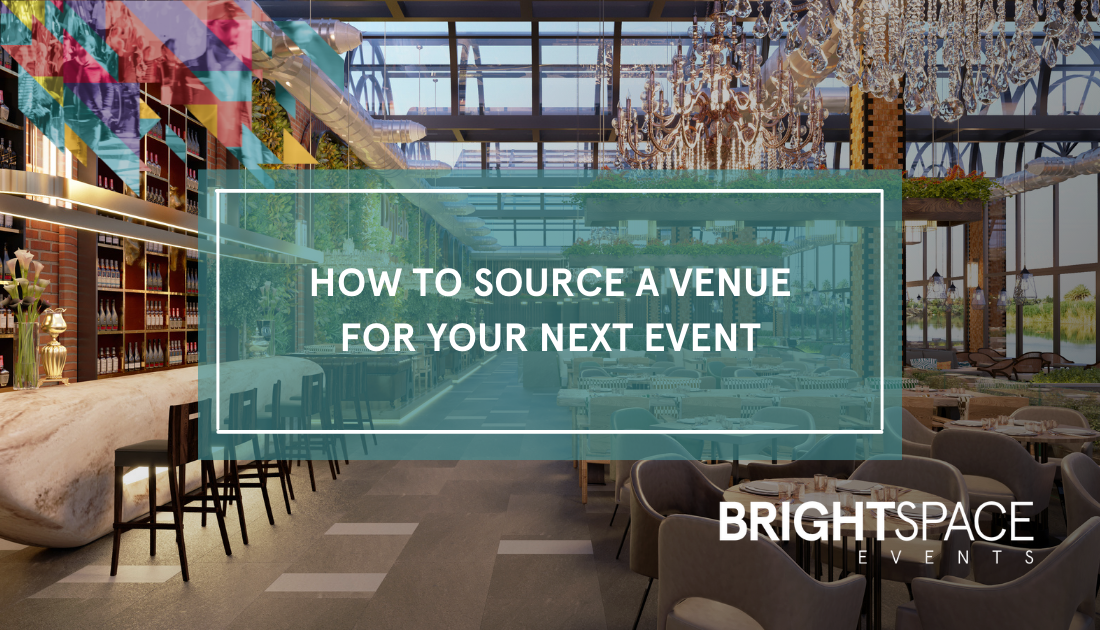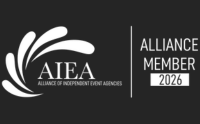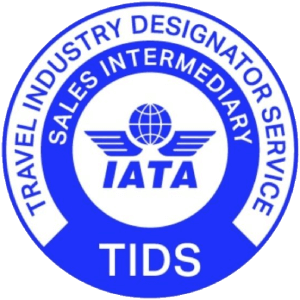Updated May 2024
Industry surveys from our friends at Cvent pleasingly are projecting growth across all meeting and event sizes in 2024. The data indicates that a massive 78% of respondents anticipate an increase in the number of small and medium-sized meetings, defined as events with fewer than 100 participants which is very pleasing news. Concurrently, an equal percentage of 78% foresee a rise in meetings with over 100 participants which is where the magic happens, if you ask us.
As we know, planning an event involves numerous decisions, with one of the most critical being the selection of the perfect venue. The venue sets the tone for the entire event, impacting everything from the guest experience to the overall success of the occasion. Get this wrong and you are instantly creating a lot of work for yourself and will be continually on the back foot. Whether you’re organising a corporate conference, a product launch, a celebratory dinner or any other gathering, finding the right venue is key to creating a memorable and successful event.
Checklist for finding the perfect venue
Before speaking to potential venues, it’s crucial to have a clear understanding of your requirements and what you’re willing to compromise on and what is a deal breaker. Include all your key stakeholders and then design a comprehensive “venue wish list” that answers all the following questions:
- Date(s) and Time(s) – Include any setup and breakdown periods on adjacent days or evenings.
- Location – Specify not just the destination but also the desired area, such as city centre, near a railway station, airport, or rural setting.
- Travel – delegate travel is usually the largest contributing factor to your environmental impact so this is crucial at venue selection
- Sustainability – This is an opportune time to initiate conversations and encourage your clients to prioritise sustainability.
- Number of Attendees including for breakouts or dinners
- Required Rooms and Room Layouts
- Accommodation Needs (if any)
- Food and Beverage Requirements
- Audio-Visual Equipment Necessities
- Budget!!
- Accessibility Provisions – Specify if you need accommodations for individuals with physical, hearing, or visual impairments.
- Crew areas, production offices and catering
- Deal-breakers or “Killer” Criteria – For example, if you’re organising a conference for 300 delegates, is it essential for all attendees to be accommodated under the same roof? Be upfront about such non-negotiable requirements to avoid wasting time on unsuitable proposals.
Using a CVB or Venue Finding Agent
A Convention & Visitor Bureau (CVB), such as Visit Manchester, is an impartial destination expert. Their local knowledge can be invaluable in connecting you with key contacts and uncovering hidden gems that may not be widely known, beyond the popular high street brands.
Another option is the ever-growing availability of free venue finding websites, which are digital equivalents of venue finding agents. These platforms allow you to enter your event specifications and submit your inquiry with a single click, reaching venues that match your requirements. Some of the most popular examples include:
We would urge caution, however, as the many and varied nuances that make the perfect venue are very hard to condense into easily digitised, searchable fields and tick boxes so do make sure you do your own extensive research as well.
Hybrid Event Capabilities
With the rise of virtual and hybrid events, it’s essential to evaluate the venue’s technical capabilities. Look for venues equipped with reliable high-speed internet, dedicated streaming studios, and the necessary audio-visual equipment to support a seamless hybrid experience for both in-person and remote attendees. According to a survey, 73% of event professionals believe that hybrid events will become more prevalent in the future. The good news is that a lot of venues used the pandemic shut down to completely overhaul their facilities so there’s plenty of state of the art options out there now.
Venues should also have experience with popular virtual event platforms, such as Zoom, Microsoft Teams, or Hopin. A study by Markletic found that 68% of event planners use virtual event platforms to enhance their hybrid events. On-site technical support teams should be proficient in troubleshooting and managing hybrid event technology to ensure a seamless experience for both in-person and virtual attendees.
Event Safety and Security
Ensuring the safety and well-being of your guests should be a top priority. Assess the venue’s emergency protocols, fire safety measures, cybersecurity and accessibility features. Additionally, consider the venue’s capacity limitations, crowd control measures, and security arrangements to maintain a secure environment.
Evaluate the venue’s fire safety measures, including fire alarm systems, sprinkler systems, and clearly marked emergency exits. Ensure compliance with local fire codes and regulations. For hybrid events, assess the venue’s cybersecurity measures to protect against potential cyber threats, such as data breaches or hacking attempts.
We’d also recommend that you start carrying out your Risk Assessment now as it is often expensive and time consuming to mitigate inherent venue risks that weren’t identified prior to contract.
Event Management and Logistics
Evaluate the venue’s event management team and their experience in handling events similar to yours. A well-organised and responsive team can make a significant difference in the smooth execution of your event. Additionally, consider logistics such as parking availability, loading bays and goods lifts for easy set-up and break-down, and on-site catering options.
A study by the Professional Convention Management Association (PCMA) found that experienced event planners can save up to 25% in overall event costs through effective planning and negotiation.
Parking and transportation accessibility are crucial factors, as they can significantly impact not only the event’s carbon footprint but also the attendee experience and turnout. Ensure the venue offers ample parking spaces or is easily accessible via public transportation park and ride. According to a survey by Eventbrite, 52% of attendees cited convenient parking as a top consideration when attending events.
Electric vehicle charging points are also a consideration and worth noting in your event information for attendees.
Location and Accessibility
Despite the comeback of in-person events, a significant 93% of event marketers indicate they plan to invest in virtual events going forward. A LinkedIn survey spanning over 1,800 marketers across 13 countries found that 85% of respondents had organised virtual events within the past 12 months.
The venue’s location should be convenient for your target audience, taking into account factors such as proximity to transportation hubs, accommodations, and local attractions. Ensure the venue is easily accessible for attendees with disabilities, providing ample parking and appropriate accommodations.
Capacity and Layout
Carefully assess the venue’s capacity to accommodate your expected guest count comfortably. Consider the layout of the space, including the arrangement of seating, exhibition areas, breakout rooms, and registration areas. A well-designed layout and flow can enhance the overall attendee experience and facilitate networking opportunities.
A study by the Professional Convention Management Association (PCMA) found that effective layout design can increase attendee engagement by up to 30%.
If your event includes presentations or performances, ensure the venue has appropriate staging areas, lighting, and sound systems to accommodate your requirements. According to a survey by the Event Marketing Institute, 78% of attendees consider the quality of audio-visual equipment as a crucial factor in their overall event experience.
Ambience and Branding
The ambience and style of the venue can significantly contribute to the overall event experience and reinforce your event’s identity as well as complimenting the company or product brand. Consider the decor, lighting, sound capabilities, branding opportunities, customisation options, and outdoor spaces.
The venue’s look and feel should align with the overall theme and tone of your event as well as your brand. Evaluate the decor, lighting, and architectural elements to ensure they complement your event’s branding and desired atmosphere. Some venues may also offer customisation options to personalise the space further.
Always be very clear about opportunities to display your own branding materials and signage if that’s important – some of the higher end hotels don’t allow any overt branding in public areas, for example.
Flexibility and Contingency Planning
Unforeseen circumstances can arise, so it’s crucial to consider the venue’s flexibility in accommodating potential changes or contingency plans. Discuss their policies on date changes, capacity adjustments, and backup options in case of emergencies or inclement weather.
According to a study by the Event Safety Alliance, 42% of event professionals have experienced a major disruption due to severe weather or natural disasters in the past five years. Discuss the venue’s contingency plans for dealing with inclement weather, power outages, or other emergencies that could disrupt your event.
Review the venue’s contract and understand their policies regarding force majeure clauses, which address circumstances beyond either party’s control and may impact the event’s execution. A study by the Professional Convention Management Association (PCMA) found that 63% of event planners have experienced a force majeure situation in the past five years.

Trust BrightSpace events for the ultimate event management experience
Discover the perfect venue for your event with Brightspace Events. Our event management experts specialise in venue sourcing, seamlessly aligning your vision with the ideal location. Trust our meticulous approach as we evaluate technical capabilities, safety protocols, and logistical considerations. With our extensive industry network and negotiating prowess, we’ll secure the best venue to elevate your event’s success. Let Brightspace Events take the reins, elevate your event game – contact us at hello@brightspaceevents.co.uk to get started and create moments that resonate!








